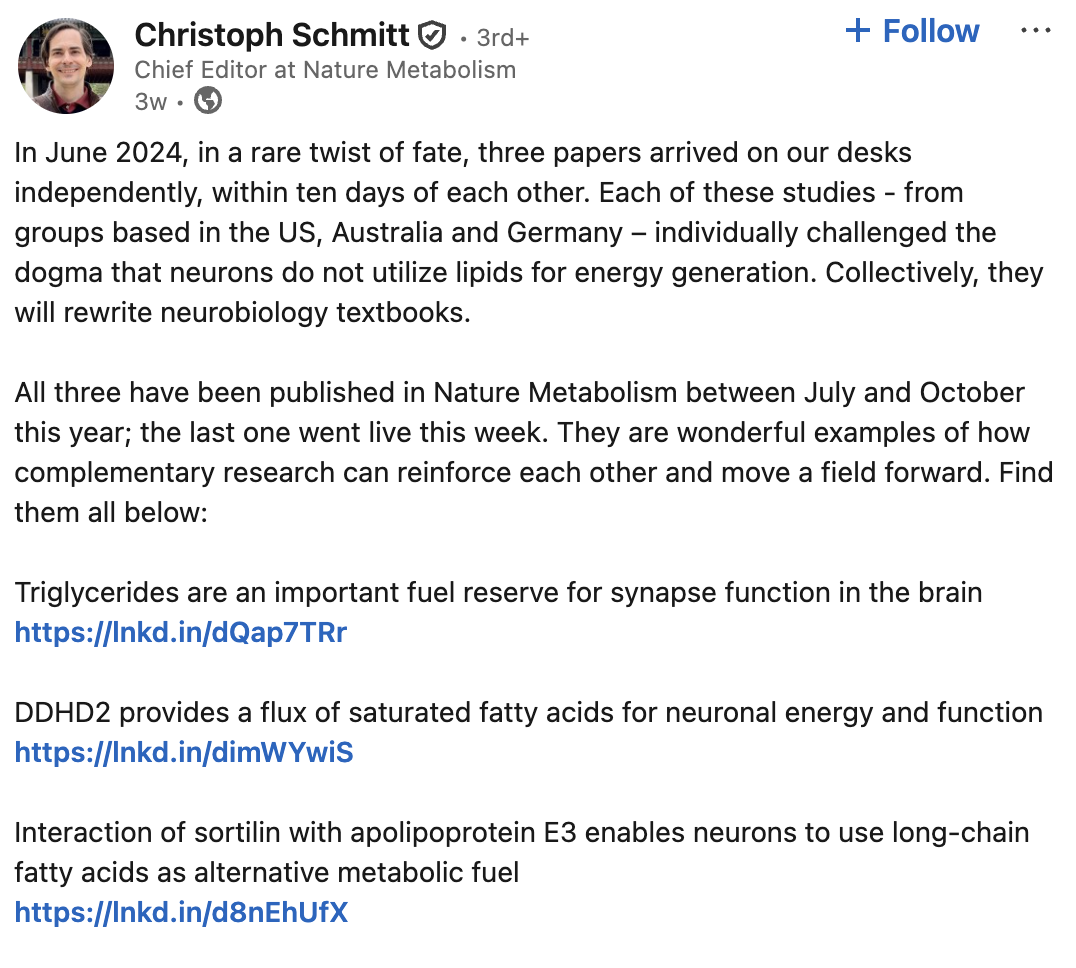Papers:
Triglycerides are an important fuel reserve for synapse function in the brain
DDHD2 provides a flux of saturated fatty acids for neuronal energy and function
Although fatty acids support mitochondrial ATP production in most tissues, neurons are believed to rely exclusively on glucose for energy. Here we show that genetic ablation of the triglyceride and phospholipid lipase Ddhd2 impairs mitochondrial respiration and ATP synthesis in cultured neurons, despite increased glycolysis. This defect arises from reduced levels of long-chain saturated free fatty acids, particularly myristic, palmitic and stearic acids, normally released in an activity-dependent manner by Ddhd2. Inhibition of mitochondrial fatty acid import in wild-type neurons similarly reduced mitochondrial respiration and ATP production. Saturated fatty acyl-coenzyme A treatment restored mitochondrial energy production in Ddhd2 knockout neurons. When provided in combination, these activated fatty acyl-CoA supplements also rescued defects in membrane trafficking, synaptic function and protein homeostasis. These findings uncover that neurons perform β-oxidation of endogenous long-chain free fatty acids to meet ATP demands and reveal a potential therapeutic strategy for hereditary spastic paraplegia 54 caused by DDHD2 mutations.
Supplementation with 1 µM M-CoA, P-CoA and S-CoA acids, alone or combined, for 48 h restored mitochondrial respiration and ATP production significantly in Ddhd2−/− neurons (Fig. 1g–k).
Sortilin (SORT1) is a lipoprotein receptor that shows genome-wide association with hypercholesterolaemia, explained by its ability to control hepatic output of lipoproteins. Although SORT1 also shows genome-wide association with Alzheimer disease and frontotemporal lobe dementia, the most prevalent forms of age-related dementias, sortilin’s contribution to human brain lipid metabolism and health remains unclear. Here we show that sortilin mediates neuronal uptake of polyunsaturated fatty acids carried by apolipoprotein E (apoE). Using humanized mouse strains and induced pluripotent stem cell-based cell models of brain lipid homeostasis, we demonstrate that internalized lipids are converted into ligands for peroxisome proliferator-activated receptor alpha inducing transcription profiles that enable neurons to use long-chain fatty acids as metabolic fuel when glucose is limited. This pathway works with apoE3 but cannot operate with the Alzheimer disease risk factor apoE4, which disrupts sortilin’s endocytic activity. Our data indicate a role for the lipoprotein receptor sortilin in metabolic fuel choice in neurons, which may be crucial when glucose supply is limited, such as in the ageing brain.
These papers were commented by the ALZForum: ApoE4 Sparks Neuronal Energy Crisis
- ApoE4 hobbles neurons’ ability to take up polyunsaturated fatty acids.
- Without them, mitochondria cannot use long-chain fatty acids as fuel.
- The energy shortage dampens synaptic transmission, especially when glucose is scarce.
What could be therapeutic interventions based on the above? ChatGPT and Grok suggest PPARα agonists such as geemfibrozil, omega-3 PUFAs, or acetyl-L-carnitine. However, I don’t think there’s much evidence that those work in humans.
